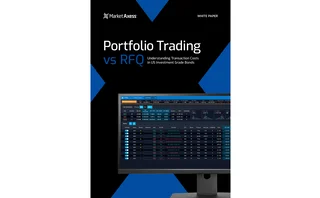CFTC Split Over Inter-Affiliate Clearing Exemptions

The US Commodity Trading Futures Commission (CFTC) has proposed clearing exemptions for inter-affiliate trading of swaps under Title VII of the Dodd-Frank Act, but has sought public consultation to amend an internal split.
Under the proposal, the trading of swap contracts inter-affiliate, that is, within the same corporate group, would be exempt from the clearing requirements due to come into force with the establishment of Swap Execution Facilities (SEFs) this year. However, the proposal states that the trades must be documented and reported as normal, with variation margin payments included.
CFTC chairman Gary Gensler supported the move, saying that the rules fell in line with what European regulators were proposing under the European Market Infrastructure Regulation (EMIR).
"One of the primary benefits of swaps market reform is that standard swaps between financial firms will move into central clearing, which will significantly lower the risks of the highly interconnected financial system," he said in a statement. "Transactions between affiliates, however, are of a different nature than transactions between nonaffiliated parties. Though transactions between affiliates pose risk, much of the risk relates to their affiliates rather than external parties."
Dissent
However, commissioners Jill Sommers and Scott O'Malia opposed aspects of the proposed rules, saying that the payment of variation margins inter-affiliate placed unnecessary financial and administrative burdens on firms.
Variation margins are typically intra-day payments made by clearing members to the house, in order to provide a capital cushion against significant devaluations of risky positions.
"We believe it is entirely appropriate that the Commission exempt inter-affiliate swaps from the clearing mandate," they said. "Unfortunately, this proposal inserts a requirement that most financial entities engaging in inter-affiliate swaps post variation margin to one another. It is not clear that this requirement will do anything other than create administrative burdens and operational risk while unnecessarily tying up capital that could otherwise be used for investment."
Variation margins are typically intra-day payments made by clearing members to the house, in order to provide a capital cushion against significant devaluations of risky positions. The commissioners also disagreed with Gensler's assertion of compatibility with European regulation.
"The variation margin requirement is also largely inconsistent with the requirements included in EMIR. As we have both made clear during the implementation process, we believe coordination with our global counterparts is critical to the success of this new framework."
Although the proposal was passed by a seratim vote of three to two, it will be open for comment from 30 days after publication in the Federal Register. Ongoing reforms of the swaps market will institute centralized clearing of standard derivatives contracts as defined by the CFTC, and their trading on electronic platforms known as SEFs in the interests of reducing systemic risk.
Only users who have a paid subscription or are part of a corporate subscription are able to print or copy content.
To access these options, along with all other subscription benefits, please contact info@waterstechnology.com or view our subscription options here: http://subscriptions.waterstechnology.com/subscribe
You are currently unable to print this content. Please contact info@waterstechnology.com to find out more.
You are currently unable to copy this content. Please contact info@waterstechnology.com to find out more.
Copyright Infopro Digital Limited. All rights reserved.
As outlined in our terms and conditions, https://www.infopro-digital.com/terms-and-conditions/subscriptions/ (point 2.4), printing is limited to a single copy.
If you would like to purchase additional rights please email info@waterstechnology.com
Copyright Infopro Digital Limited. All rights reserved.
You may share this content using our article tools. As outlined in our terms and conditions, https://www.infopro-digital.com/terms-and-conditions/subscriptions/ (clause 2.4), an Authorised User may only make one copy of the materials for their own personal use. You must also comply with the restrictions in clause 2.5.
If you would like to purchase additional rights please email info@waterstechnology.com
More on Trading Tech
Expanded oversight for tech or a rollback? 2025 set to be big for regulators
From GenAI oversight to DORA and the CAT to off-channel communication, the last 12 months set the stage for larger regulatory conversations in 2025.
DORA flood pitches banks against vendors
Firms ask vendors for late addendums sometimes unrelated to resiliency, requiring renegotiation
IPC’s C-suite shuffle signals bigger changes for trader voice tech
Waters Wrap: After a series of personnel changes at the legacy provider, WatersTechnology examines what these moves might mean for the future of turrets and trader voice.
WatersTechnology latest edition
Check out our latest edition, plus more than 12 years of our best content.
From no chance to no brainer: Inside outsourced trading’s buy-side charm offensive
Previously regarded with hesitancy and suspicion by the buy side, four asset managers explain their reasons for embracing outsourced trading.
Band-aids vs build-outs: Best practices for exchange software migrations
Heetesh Rawal writes that legacy exchange systems are under pressure to scale to support new asset classes and greater volumes, leaving exchange operators with a stark choice: patch up outdated systems and hope for the best or embark on risky but rewarding replacement projects.
Portfolio trading vs RFQ: Understanding transaction costs in US investment-grade bonds
The MarketAxess research team explores how such factors as order size, liquidity profiles and associated costs determine whether a portfolio trade or an RFQ list trade is the optimal choice.
IEX, MEMX spar over new exchange’s now-approved infrastructure model
As more exchanges look to operate around-the-clock venues, the disagreement has put the practices of market tech infrastructure providers under a microscope.







